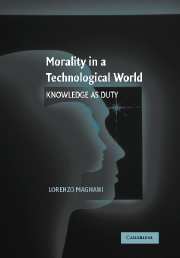Book contents
- Frontmatter
- Contents
- Preface
- 1 Respecting People as Things: Environment
- 2 Treating People as Means: Cloning
- 3 Hybrid People, Hybrid Selves: Artifacts, Consciousness, Free Will
- 4 Knowledge as Duty: Cyberprivacy
- 5 Freedom and Responsibility: Bad Faith
- 6 Creating Ethics: Good Reasons and Good Arguments
- 7 Inferring Reasons: Practical Reasoning, Abduction, Moral Mediators
- Afterword
- References
- Index
5 - Freedom and Responsibility: Bad Faith
Published online by Cambridge University Press: 18 July 2009
- Frontmatter
- Contents
- Preface
- 1 Respecting People as Things: Environment
- 2 Treating People as Means: Cloning
- 3 Hybrid People, Hybrid Selves: Artifacts, Consciousness, Free Will
- 4 Knowledge as Duty: Cyberprivacy
- 5 Freedom and Responsibility: Bad Faith
- 6 Creating Ethics: Good Reasons and Good Arguments
- 7 Inferring Reasons: Practical Reasoning, Abduction, Moral Mediators
- Afterword
- References
- Index
Summary
So that in the nature of man, we find three principal causes of quarrel. First, competition; secondly, diffidence; thirdly, glory.
Thomas Hobbes, LeviathanAs we have seen, it is critically important that we explore the ethical implications of technology so that we understand its relationship to, say, the medicalization of life and cybernetic globalization. While these are crucial issues, they are limited to the collective level of awareness and fail to address other factors. What about the level of personal consciousness? How does what we know as individuals affect human dignity? If we lack awareness of how we think, of how and why we construct our beliefs, will we be equipped to make the best possible decisions? How does the manner in which we obtain and manage information shape our identities and self-perceptions? Our personal relationship to knowledge plays a part in determining our own level of freedom as well as our capacity for improving the lives of others. If we fail to interrogate such issues, we deprive ourselves of a way to improve the lives of other people, and consequently, knowledge as duty must be embraced not only nationally or globally but also at the local level, individual by individual.
I believe some answers to these questions can be found in Jean-Paul Sartre's notion of bad faith, which, put simply, is a kind of falsehood that involves lying to oneself.
- Type
- Chapter
- Information
- Morality in a Technological WorldKnowledge as Duty, pp. 128 - 161Publisher: Cambridge University PressPrint publication year: 2007

